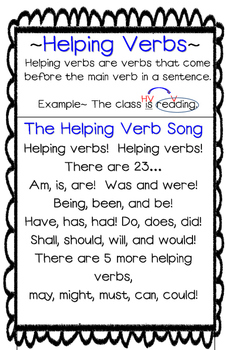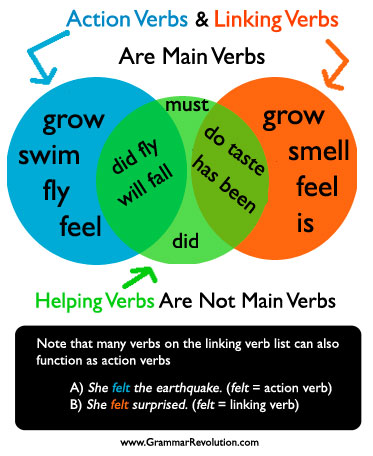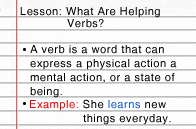
The auxiliary verbs of a language form a closed class, i.e., there is a fixed, relatively small number of them. The auxiliary is said to "help" the infinitive. They generally appear together with an infinitive.
HELPING VERBS LIST WITH EXAMPLES FULL
Auxiliaries like these typically appear with a full verb that carries the main semantic content of the clause.Īuxiliary verbs typically help express grammatical tense, aspect, mood, and voice. These auxiliaries help express a question, show tense/aspect, or form passive voice. – être, from which sommes is inflected, 'be' is an auxiliary used to build the passive voice in French. I have seen the sun = 'I have seen the sun/I saw the sun.' g. – avoir, from which ai is inflected, 'have' is an auxiliary used to build the perfect tense/aspect in French.

She is to home gone = 'She went home/She has gone home.' f. – sein, from which ist is inflected, 'be' is an auxiliary used with movement verbs to build the perfect tense/aspect in German. That became many times said = 'That was said many times.' e. – werden, from which wurde is inflected, become is an auxiliary used to build the passive voice in German. (I) have grabbed your pencil = 'I have taken your pencil.' d. – he is an auxiliary accompanying the infinitive coger, used here to form a verb phrase, the perfect present in Spanish. – have, from which has is inflected, is an auxiliary used in expressing the perfect aspect of give. Do you want tea? – do is an auxiliary accompanying the infinitive, want, used here to form a question – see do-support.

Future Perfect Tense – I will have been, you will have been, he/she/it will have been, we will have been, they will have been.Past Perfect Tense -I had been, you had been, he/she/it had been, we had been, they had been.Present Perfect Tense – I have been, you have been, he/she/it has been, we have been, they have been.Future Tense – I will be, you will be, he/she/it will be, we will be, they will be.Past Tense – I was, you were, he/she/it, was, we were, they were.Present tense – I am, you are, he/she/it is, we are, they are.Here are the being verbs in all the past, present, and future tenses. A noun or pronoun does not always take action. Past Perfect Tense – I/you/he/she/it/we/they had brokenįuture Perfect Tense – I/you/he/she/it/we/they will have brokenīeing Verbs tell about something in a state of being. Present Perfect Tense – I/you/he/she/it/we/they have broken

Past Tense – I/you/he/she/it/we/they brokeįuture Tense – I/you/he/she/it/we/they will break Present tense – I/you/we/they break, he/she/it breaks Try putting other verbs in the place of break.

Here is a list of examples for each verb tense using the verb break. Verbs also use special rules for telling when something happened – in the past, the present, or the future.


 0 kommentar(er)
0 kommentar(er)
